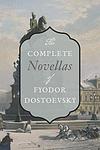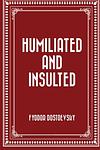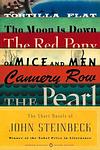Fyodor Dostoevsky
Fyodor Dostoevsky was a Russian novelist, short story writer, essayist, and journalist. He is widely considered one of the greatest psychological novelists in world literature. His works explore human psychology in the troubled political, social, and spiritual atmospheres of 19th-century Russia. Dostoevsky's most notable works include 'Crime and Punishment', 'The Idiot', 'Demons', and 'The Brothers Karamazov'. His literary output explores themes of morality, free will, and the existential struggles of life.
Books
This list of books are ONLY the books that have been ranked on the lists that are aggregated on this site. This is not a comprehensive list of all books by this author.
-
1. Crime and Punishment
A young, impoverished former student in Saint Petersburg, Russia, formulates a plan to kill an unscrupulous pawnbroker to redistribute her wealth among the needy. However, after carrying out the act, he is consumed by guilt and paranoia, leading to a psychological battle within himself. As he grapples with his actions, he also navigates complex relationships with a variety of characters, including a virtuous prostitute, his sister, and a relentless detective. The narrative explores themes of morality, redemption, and the psychological impacts of crime.
-
2. The Brothers Karamazov
This classic novel explores the complex, passionate, and troubled relationship between four brothers and their father in 19th century Russia. The narrative delves into the themes of faith, doubt, morality, and redemption, as each brother grapples with personal dilemmas and family conflicts. The story culminates in a dramatic trial following a murder, which serves as a microcosm of the moral and philosophical struggles faced by each character, and by extension, humanity itself.
-
3. The Idiot
The book follows the story of a kind-hearted and naive protagonist who returns to Russia from a Swiss sanatorium, where he was treated for a severe epileptic condition. Despite his pure intentions, he gets entangled in a web of love, greed, and manipulation, leading to tragic consequences. The novel explores themes of innocence, love, sacrifice, and societal expectations, offering a profound critique of Russian society during the 19th century.
-
4. Demons
"The Possessed" is a complex political novel set in a provincial Russian town, exploring the destructive influence of radical ideologies on society. The narrative revolves around a group of revolutionaries, their philosophical debates and their destructive actions, driven by nihilism and anarchism. The story is a critique of the political and social chaos of the time, showcasing the author's deep understanding of human psychology and his profound insights into the human condition. It is an exploration of faith, reason, and the nature of freedom and is considered one of the most significant works of Russian literature.
-
5. Notes from the Underground
This novel is a profound exploration of the human psyche through the eyes of a bitter and isolated retired civil servant living in St. Petersburg. The protagonist, a self-proclaimed "sick" and "spiteful" man, delves into his past experiences and personal philosophies in a series of rambling and often contradictory monologues. His existential musings touch on themes such as free will, determinism, and the nature of human action, often challenging the prevailing ideologies of his time. The narrative provides a deep and unsettling insight into the darker aspects of human consciousness.
-
6. The Gambler
"The Gambler" is a novel that explores the psychological implications of addiction, specifically gambling. The story is narrated by a young tutor working in the household of a wealthy Russian general. He becomes obsessed with roulette and falls in love with a beautiful but cruel woman in the general's employ. The narrative delves into his descent into addiction, his tumultuous relationship with the woman he loves, and the impact of his destructive habits on his life and those around him.
-
7. Poor Folk
The novel unfolds as a poignant exchange of letters between two impoverished relatives, an elderly clerk and a young woman, who share their struggles, hopes, and the grim reality of their lives in 19th-century St. Petersburg. Their correspondence reveals the depth of their bond and the social pressures that keep them trapped in poverty. Through their heartfelt and sometimes despairing messages, the narrative paints a vivid picture of the harsh societal conditions of the time, exploring themes of poverty, class, and the human desire for dignity and connection amidst adversity.
-
8. Humiliated And Insulted
This novel delves into the complex emotional and psychological landscapes of its characters, focusing on a young writer who becomes entangled in the lives of an orphaned girl, his unrequited love, and a friend who betrays him. Set against the backdrop of 19th-century Russia, the narrative explores themes of redemption, love, and the human capacity for forgiveness amidst societal decay and personal despair. Through its intricate portrayal of relationships and moral dilemmas, the story examines the depths of human suffering and the potential for humility and compassion to emerge from humiliation and insult.
-
9. Short Novels
This collection of works by the renowned Russian author delves into the depths of the human psyche, exploring themes of morality, free will, and the existential struggles of individuals in society. The narratives often focus on characters who are grappling with profound internal conflicts, societal pressures, and ethical dilemmas. Through a series of intense, philosophical dialogues and dramatic plot developments, the author examines the nature of good and evil, the possibility of redemption, and the enduring question of what it means to be human. Each novella in the collection serves as a powerful exploration of the complexities of the soul and the human condition.








